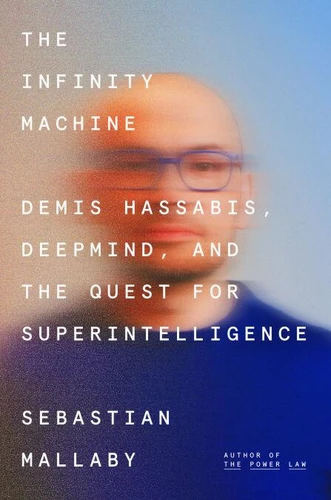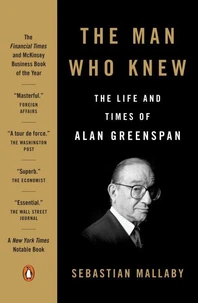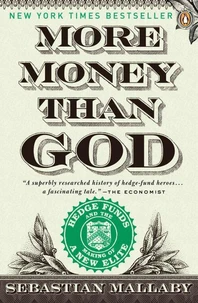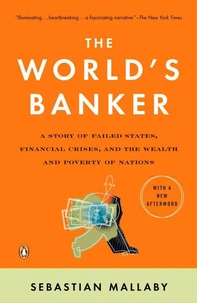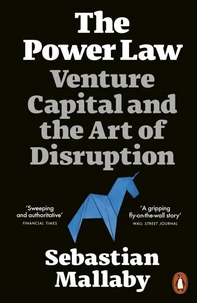The Infinity Machine. Demis Hassabis, DeepMind, and the Quest for Superintelligence
Par :Formats :
Actuellement indisponible
Cet article est actuellement indisponible, il ne peut pas être commandé sur notre site pour le moment. Nous vous invitons à vous inscrire à l'alerte disponibilité, vous recevrez un e-mail dès que cet ouvrage sera à nouveau disponible.
Disponible dans votre compte client Decitre ou Furet du Nord dès validation de votre commande. Le format ePub protégé est :
- Compatible avec une lecture sur My Vivlio (smartphone, tablette, ordinateur)
- Compatible avec une lecture sur liseuses Vivlio
- Pour les liseuses autres que Vivlio, vous devez utiliser le logiciel Adobe Digital Edition. Non compatible avec la lecture sur les liseuses Kindle, Remarkable et Sony
- Non compatible avec un achat hors France métropolitaine
 , qui est-ce ?
, qui est-ce ?Notre partenaire de plateforme de lecture numérique où vous retrouverez l'ensemble de vos ebooks gratuitement
Pour en savoir plus sur nos ebooks, consultez notre aide en ligne ici
- Nombre de pages464
- FormatePub
- ISBN978-0-593-83185-4
- EAN9780593831854
- Date de parution09/06/2026
- Protection num.Adobe DRM
- Infos supplémentairesepub
- ÉditeurPenguin Press
Résumé
From one of our leading chroniclers of the intersection of innovation and capitalism, a landmark reckoning - based on unprecedented access - with one of the world's most brilliant and driven tech visionaries and his game-changing company. Even by the standard of a tech industry stacked with so-called visionary leaders possessed of the godspark of genius, Demis Hassabis is universally recognized as a special case.
Born poor in North London to immigrant parents, a dominant chess prodigy by age five and wizard coder in his teens, he turned down a seven figure offer before he turned 18 to feed his insatiable scientific curiosity at Cambridge. Later, he added a neuroscience PhD to his computer science skills to pursue the dream of artificial general intelligence, his ultimate goal to solve the world's hardest problems and usher in an era of super-abundance.
And along with a small group of fellow travelers around the world, that is the path he is very much still on, winning a Nobel Prize along the way, and imagining machines that will unlock the deepest mysteries of the universe. Hassabis has given Sebastian Mallaby a great deal of his own time, sitting still for over thirty hours of probing conversations, and has opened up his company to him, allowing Mallaby to spend hundreds of hours talking to all its key players, including people still there, like Shane Legg, and those who've left, like Mustafa Suleyman.
The result is a revelation-packed account of a singular figure and his company and a profound reckoning with this whole protean field in the crucial, indeed historic era, when it went from the periphery to the center of the world. No one questions Demis Hassabis's brilliance, commitment, or the worthiness of his ultimate goals. There are those who do flinch at the heat of his fire, and question some of his strategies.
His competitors, of course, want to beat him. He is in a game at a moment where the sense of the stakes is matched only by the exorbitant costs - for talent, and for compute. Faustian bargains abound. Celebrated scientists pursue the technology because, like Robert Oppenheimer, they cannot resist the sweetness of discovery. Others pursue it for money or power. The inventors believe they control their technology, but often, the technology controls them.
THE INFINITY MACHINE surfaces Hassabis's story's importance across a number of dimensions. Not least, crucially, this is not at heart a Silicon Valley story. Hassabis deals with the Valley and takes its money, but he has remained outside of it, and indeed, furiously critical of it, often lambasting its leaders in his conversations with Mallaby. DeepMind has never seen large language models as the one path to the AGI mountaintop.
That left them blindsided by the OpenAI ChatGPT breakthrough, but it has also caused them to advance on a much broader front, and arguably have a bigger real world impact than their competitors. So far. The end of this race cannot be known, but as this great book shows us, the place of Demis Hassabis and DeepMind in the history of tech, capitalism, and science is secure.
Born poor in North London to immigrant parents, a dominant chess prodigy by age five and wizard coder in his teens, he turned down a seven figure offer before he turned 18 to feed his insatiable scientific curiosity at Cambridge. Later, he added a neuroscience PhD to his computer science skills to pursue the dream of artificial general intelligence, his ultimate goal to solve the world's hardest problems and usher in an era of super-abundance.
And along with a small group of fellow travelers around the world, that is the path he is very much still on, winning a Nobel Prize along the way, and imagining machines that will unlock the deepest mysteries of the universe. Hassabis has given Sebastian Mallaby a great deal of his own time, sitting still for over thirty hours of probing conversations, and has opened up his company to him, allowing Mallaby to spend hundreds of hours talking to all its key players, including people still there, like Shane Legg, and those who've left, like Mustafa Suleyman.
The result is a revelation-packed account of a singular figure and his company and a profound reckoning with this whole protean field in the crucial, indeed historic era, when it went from the periphery to the center of the world. No one questions Demis Hassabis's brilliance, commitment, or the worthiness of his ultimate goals. There are those who do flinch at the heat of his fire, and question some of his strategies.
His competitors, of course, want to beat him. He is in a game at a moment where the sense of the stakes is matched only by the exorbitant costs - for talent, and for compute. Faustian bargains abound. Celebrated scientists pursue the technology because, like Robert Oppenheimer, they cannot resist the sweetness of discovery. Others pursue it for money or power. The inventors believe they control their technology, but often, the technology controls them.
THE INFINITY MACHINE surfaces Hassabis's story's importance across a number of dimensions. Not least, crucially, this is not at heart a Silicon Valley story. Hassabis deals with the Valley and takes its money, but he has remained outside of it, and indeed, furiously critical of it, often lambasting its leaders in his conversations with Mallaby. DeepMind has never seen large language models as the one path to the AGI mountaintop.
That left them blindsided by the OpenAI ChatGPT breakthrough, but it has also caused them to advance on a much broader front, and arguably have a bigger real world impact than their competitors. So far. The end of this race cannot be known, but as this great book shows us, the place of Demis Hassabis and DeepMind in the history of tech, capitalism, and science is secure.
From one of our leading chroniclers of the intersection of innovation and capitalism, a landmark reckoning - based on unprecedented access - with one of the world's most brilliant and driven tech visionaries and his game-changing company. Even by the standard of a tech industry stacked with so-called visionary leaders possessed of the godspark of genius, Demis Hassabis is universally recognized as a special case.
Born poor in North London to immigrant parents, a dominant chess prodigy by age five and wizard coder in his teens, he turned down a seven figure offer before he turned 18 to feed his insatiable scientific curiosity at Cambridge. Later, he added a neuroscience PhD to his computer science skills to pursue the dream of artificial general intelligence, his ultimate goal to solve the world's hardest problems and usher in an era of super-abundance.
And along with a small group of fellow travelers around the world, that is the path he is very much still on, winning a Nobel Prize along the way, and imagining machines that will unlock the deepest mysteries of the universe. Hassabis has given Sebastian Mallaby a great deal of his own time, sitting still for over thirty hours of probing conversations, and has opened up his company to him, allowing Mallaby to spend hundreds of hours talking to all its key players, including people still there, like Shane Legg, and those who've left, like Mustafa Suleyman.
The result is a revelation-packed account of a singular figure and his company and a profound reckoning with this whole protean field in the crucial, indeed historic era, when it went from the periphery to the center of the world. No one questions Demis Hassabis's brilliance, commitment, or the worthiness of his ultimate goals. There are those who do flinch at the heat of his fire, and question some of his strategies.
His competitors, of course, want to beat him. He is in a game at a moment where the sense of the stakes is matched only by the exorbitant costs - for talent, and for compute. Faustian bargains abound. Celebrated scientists pursue the technology because, like Robert Oppenheimer, they cannot resist the sweetness of discovery. Others pursue it for money or power. The inventors believe they control their technology, but often, the technology controls them.
THE INFINITY MACHINE surfaces Hassabis's story's importance across a number of dimensions. Not least, crucially, this is not at heart a Silicon Valley story. Hassabis deals with the Valley and takes its money, but he has remained outside of it, and indeed, furiously critical of it, often lambasting its leaders in his conversations with Mallaby. DeepMind has never seen large language models as the one path to the AGI mountaintop.
That left them blindsided by the OpenAI ChatGPT breakthrough, but it has also caused them to advance on a much broader front, and arguably have a bigger real world impact than their competitors. So far. The end of this race cannot be known, but as this great book shows us, the place of Demis Hassabis and DeepMind in the history of tech, capitalism, and science is secure.
Born poor in North London to immigrant parents, a dominant chess prodigy by age five and wizard coder in his teens, he turned down a seven figure offer before he turned 18 to feed his insatiable scientific curiosity at Cambridge. Later, he added a neuroscience PhD to his computer science skills to pursue the dream of artificial general intelligence, his ultimate goal to solve the world's hardest problems and usher in an era of super-abundance.
And along with a small group of fellow travelers around the world, that is the path he is very much still on, winning a Nobel Prize along the way, and imagining machines that will unlock the deepest mysteries of the universe. Hassabis has given Sebastian Mallaby a great deal of his own time, sitting still for over thirty hours of probing conversations, and has opened up his company to him, allowing Mallaby to spend hundreds of hours talking to all its key players, including people still there, like Shane Legg, and those who've left, like Mustafa Suleyman.
The result is a revelation-packed account of a singular figure and his company and a profound reckoning with this whole protean field in the crucial, indeed historic era, when it went from the periphery to the center of the world. No one questions Demis Hassabis's brilliance, commitment, or the worthiness of his ultimate goals. There are those who do flinch at the heat of his fire, and question some of his strategies.
His competitors, of course, want to beat him. He is in a game at a moment where the sense of the stakes is matched only by the exorbitant costs - for talent, and for compute. Faustian bargains abound. Celebrated scientists pursue the technology because, like Robert Oppenheimer, they cannot resist the sweetness of discovery. Others pursue it for money or power. The inventors believe they control their technology, but often, the technology controls them.
THE INFINITY MACHINE surfaces Hassabis's story's importance across a number of dimensions. Not least, crucially, this is not at heart a Silicon Valley story. Hassabis deals with the Valley and takes its money, but he has remained outside of it, and indeed, furiously critical of it, often lambasting its leaders in his conversations with Mallaby. DeepMind has never seen large language models as the one path to the AGI mountaintop.
That left them blindsided by the OpenAI ChatGPT breakthrough, but it has also caused them to advance on a much broader front, and arguably have a bigger real world impact than their competitors. So far. The end of this race cannot be known, but as this great book shows us, the place of Demis Hassabis and DeepMind in the history of tech, capitalism, and science is secure.

